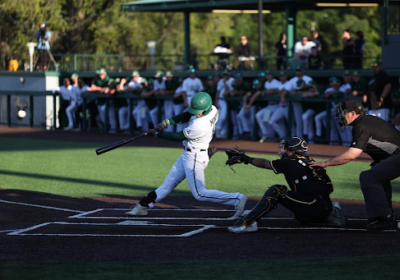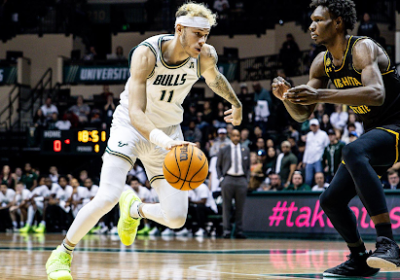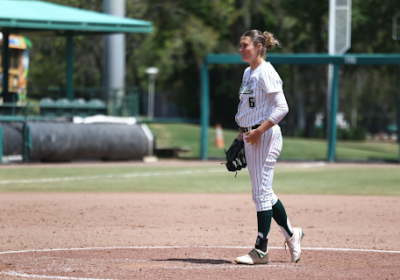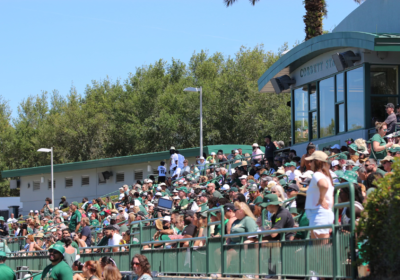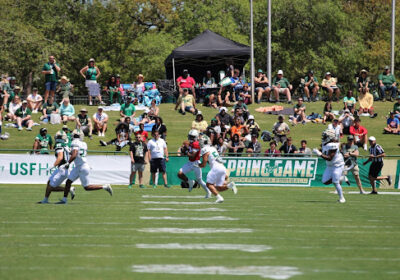Corrick adjusting to new norms and life without softball
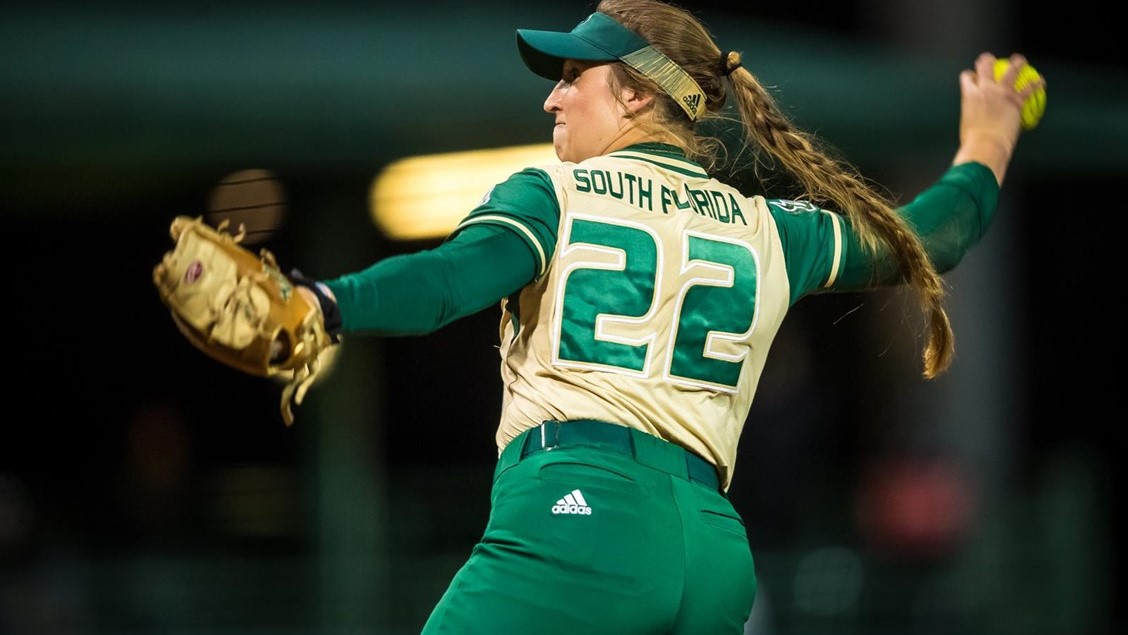
USF softball ace Georgina Corrick sat in the living room of her parents’ home in Sanford quietly working away at a ball of yarn in her lap.
“Animal Planet” was on the television in the background as she wove two crochet needles in and out, slowly working the yarn into something that vaguely resembled clothing. She’s careful not to wake the sleeping dogs on either side of her.
“I’m trying to make like the beginning of a top, so I’ve got this funky thing that kind of looks like a triangle or a spaceship,” Corrick said. “I don’t really know that many stitches, so it’s pretty plain and boring.”
A self-proclaimed “grandma,” Corrick has found ways to keep occupied in the absence of softball amid the coronavirus (COVID-19) pandemic. But crochet isn’t a hobby one would expect from a two-time AAC Pitcher of the Year.
“I really am such a grandma,” she said. “I’ve got like a hot cup of tea next to me, I’ve got two dogs on the couch asleep next to me.
“You think that being a student-athlete is a glamorous lifestyle. It’s really not. It’s just me sitting on a couch knitting.”
For now, this is how Corrick spends her time, with the athlete side of things on hold.
The student aspect, however, remains.
With in-person classes having shifted to virtual classrooms via Zoom, Blackboard or other video conference platforms, adjusting to the new format has been a challenge for a majority of students.
Corrick, a biology major, wasn’t too keen on the new format at first.
“I was definitely a little disappointed, not solely just for softball reasons, but also academically,” she said. “I was having a really good semester, I really enjoyed my professors and going to my classes and getting a lot of good hands-on learning.”
But since the transition to virtual classes, she’s found a new rhythm.
“I had a genetics lab online, I have like natural vertebrae history, like all these fun things, they’ve all moved online.
“It’s definitely a different way of learning, but I kind of like it because I get to set my own pace. I get to have a little bit more time to just kind of sit and relax.”
With much of her responsibilities, like much of everyone else’s, being moved behind a screen, getting outside adds a much-needed break from staying cooped up indoors.
Sticking to a workout plan is usually a must for student-athletes, but Corrick is using the time off to take in the outdoors.
“My exercise for the day is taking my dogs out to the park or something and try to maybe throw with my dad,” she said. “I’ve been enjoying my time off, been doing a little bit less strenuous exercise and more like kayaking, or do something that’s outdoorsy … I went for a nice jog around my neighborhood the other day.”
Training will come eventually, so enjoying the unprecedented time off has taken a bit of a burden off her shoulders, according to Corrick.
“I know I will have to get back into training soon, probably sooner rather than later,” she said. “But for right now, I’m kind of just taking it as it is because it’s too hectic of a moment right now to really be trying to complicate it with more things.”
The thought of resuming training remains in the back of Corrick’s mind, but it doesn’t mean softball will return any sooner. It only confirms that she misses it, much like her teammates whose season came to a screeching halt.
“When the first announcement came out, a lot of us were driven very strongly by our emotions, and just knowing that a rug had kind of been pulled out from under us,” Corrick said. “But [interim head] coach Jess [Moore] made it very clear, she was like, ‘The only thing that can really help is time. We have to give this time to develop … people don’t make decisions like this lightly.’”
Recognizing the decision to cancel the season was made for the safety of everyone — that it was because of something bigger than sports — was the first step.
“We have to keep in mind that while we’ve lost something, the potential loss elsewhere was even bigger,” Corrick said.
Beginning with its decision to cancel all sports and in light of the recent news that the NCAA would grant an additional year of eligibility for spring athletes, the NCAA is making the right calls, according to Corrick.
“I’m sure nothing would have kept my parents from coming into that stadium regardless,” she said, referencing USF’s initial plan to play games without fans prior to the AAC canceling the season.
“I know that we just have so many people that feel so passionately about the sport that I’m sure it still would’ve brought them out, and they would have stood outside the gate.
“They had a tough decision to make, but I think they made the right one.”
For the full conversation with Georgina Corrick, watch The Oracle Sports Podcast with Brian Hattab and Nolan Brown, which premieres later this week.


